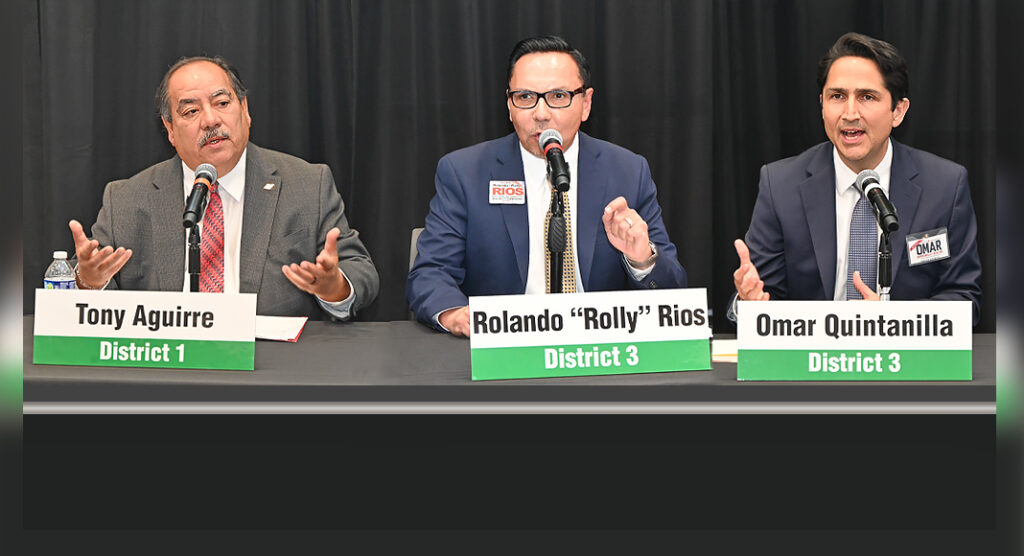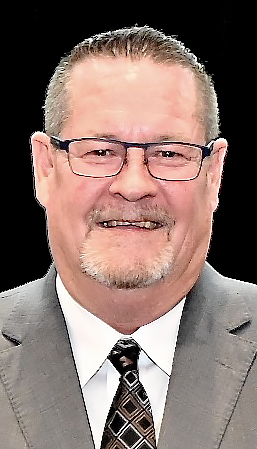
Texas Border Business
By Roberto Hugo González
The Futuro RGV McAllen Municipal Candidates Forum brought together incumbents and challengers in a spirited exchange of ideas on the city’s future, with community concerns and policy priorities front and center. Held at South Texas College and moderated by local attorney Laurel McLeaish and former STC political science professor Christopher Marshall, the forum provided McAllen voters a unique opportunity to hear directly from those seeking to lead the city.
District 1 and District 3 candidates were present. District 1 Commissioner Tony Aguirre and District 3 Commissioner Omar Quintanilla represented the incumbents. Rolando “Rollie” Rios attended as the challenger for District 3. Tim Wilkins, the challenger for District 1, was absent due to a family obligation. Tony Fiorina, External Operations Director for Hidalgo County Precinct 4, delivered his message.
Forina, speaking for Wilkins, brought a message that emphasized listening, engagement, and a proactive approach to leadership. “Tim Wilkins will question what doesn’t make sense,” Forina said. “He’ll speak up when others stay quiet because leadership isn’t about staying silent. It’s about standing firm, even when it’s uncomfortable.”
The evening began with opening remarks from each candidate, followed by a series of questions read by McLeaish and Marshall. Topics ranged from city infrastructure and drainage to water shortages, economic growth, taxes, employee unionization, and inclusivity.
One of the moderators’ earliest questions asked candidates to define their top priorities if elected or reelected. Tony Aguirre emphasized the wide scope of responsibilities city officials must balance: “The number one is really, really not a proper thing to say. We have so many things to do. Economic development, infrastructure, and education—all must be handled simultaneously.”
Rolando Rios, the challenger in District 3, focused on community outreach and listening: “We need to hear from [District 3] periodically, have town hall meetings, and get feedback from our residents. I will listen and act, but most importantly, I will lead and serve.”
Omar Quintanilla stressed the importance of quality-of-life initiatives and his track record. “We’ve made great strides, especially with drainage improvements in areas like Daffodil. We need to continue that progress and also support economic development to keep our young people here.”
Water infrastructure took center stage as drought and reservoir concerns loom large. Aguirre explained McAllen’s long-term vision: “The city has already hired an engineering firm to plan a desalinization plant, expected to cost about $200 million. We’re fighting for our share of a proposed $10 billion state water fund.”
Quintanilla highlighted a well-drilling initiative in northwest McAllen to supplement the city’s supply. “It’s a four-to-five-year plan already underway. We’re taking water security seriously,” he said.
Rios, who is newer to city planning but informed on the issue, endorsed the northside desalinization project and stressed the importance of ensuring equity across the city: “We must ensure the south side also receives the same services.”
A follow-up question addressed water conservation. All three candidates were cautious about imposing stricter regulations. Rios suggested a measured approach: “Let’s see if current rules are working first.” Aguirre noted the city’s water enforcement program, including dedicated water-use monitors, while Quintanilla advocated for regional cooperation with neighboring cities to ensure efficiency across the Valley.
Tax policy also drew significant discussion. Aguirre reminded the audience that McAllen has lowered property tax rates for four consecutive years and explained that outside visitors drive much revenue. “Sixty-five percent of our sales tax and 85 percent of hotel taxes come from outside McAllen,” he said. Quintanilla added that efficiency and responsible budgeting allowed for that consistent rate reduction and that further reductions were a goal. Rios agreed but cautioned that growth must continue to ensure services can be maintained without raising taxes.
Budget concerns segued into questions about transparency and fiscal responsibility. One audience-submitted question criticized the city’s use of executive session to discuss items such as legislative lobbying. The candidates acknowledged the balance between confidentiality and transparency. “I want to see as little executive session as possible,” Aguirre said. “We need more workshops in open session.” Quintanilla agreed and added, “We can still discuss executive session items in an open session after a vote.”
Candidates were also asked about unionization for city employees. Quintanilla and Rios expressed support for recognizing any legitimate petition. Aguirre noted he had seen no indication that employees sought unionization outside of police and fire services but committed to listening to their needs if they arose.
Infrastructure sparked strong commentary, especially in light of recent extreme rain events. Aguirre recounted being caught on Military Highway during the storms and emphasized that McAllen rebounded faster than surrounding cities. “We even helped others — 24 hours later, we were sending out equipment to neighbors,” he said.
Quintanilla highlighted the numerous drainage projects completed in District 3 during his tenure. “Six major drainage upgrades have been completed, and more are planned,” he said. Rios insisted there is still work to be done and that some areas — particularly south of the expressway — remain vulnerable.
The evening concluded with questions on housing affordability, diversity, and access. Quintanilla cited support for affordable housing programs and McAllen Housing Commission initiatives regarding rising rents. Rios called for partnerships with developers and more funding for rental assistance.
When asked how McAllen could support LGBTQ equality, Rios said, “We must be cautious about how we treat one another and ensure equitable access to jobs and facilities.” Quintanilla underscored that tolerance and inclusivity are embedded in McAllen’s culture: “We are not only tolerant but accepting and friendly.” Aguirre echoed their sentiments, stating, “We serve everyone in this city.”
The incumbents’ closing remarks emphasized their records and dedication to continued progress. “We’re independent commissioners, not part of a slate. We listen, and we serve,” said Aguirre. Quintanilla pointed to completed projects and community engagement. Rios offered a challenge: “There are parts of District 3 that have been neglected. I am that choice for change.”
The forum, streamed live and attended by a sizeable in-person audience at STC’s Pecan Campus, showcased the candidates’ policy priorities and distinct approaches to leadership. With early voting set to begin on April 22 and election day on May 3, the forum provided a pivotal moment for voters in McAllen to weigh their choices and shape the city’s future.
See related stories:















